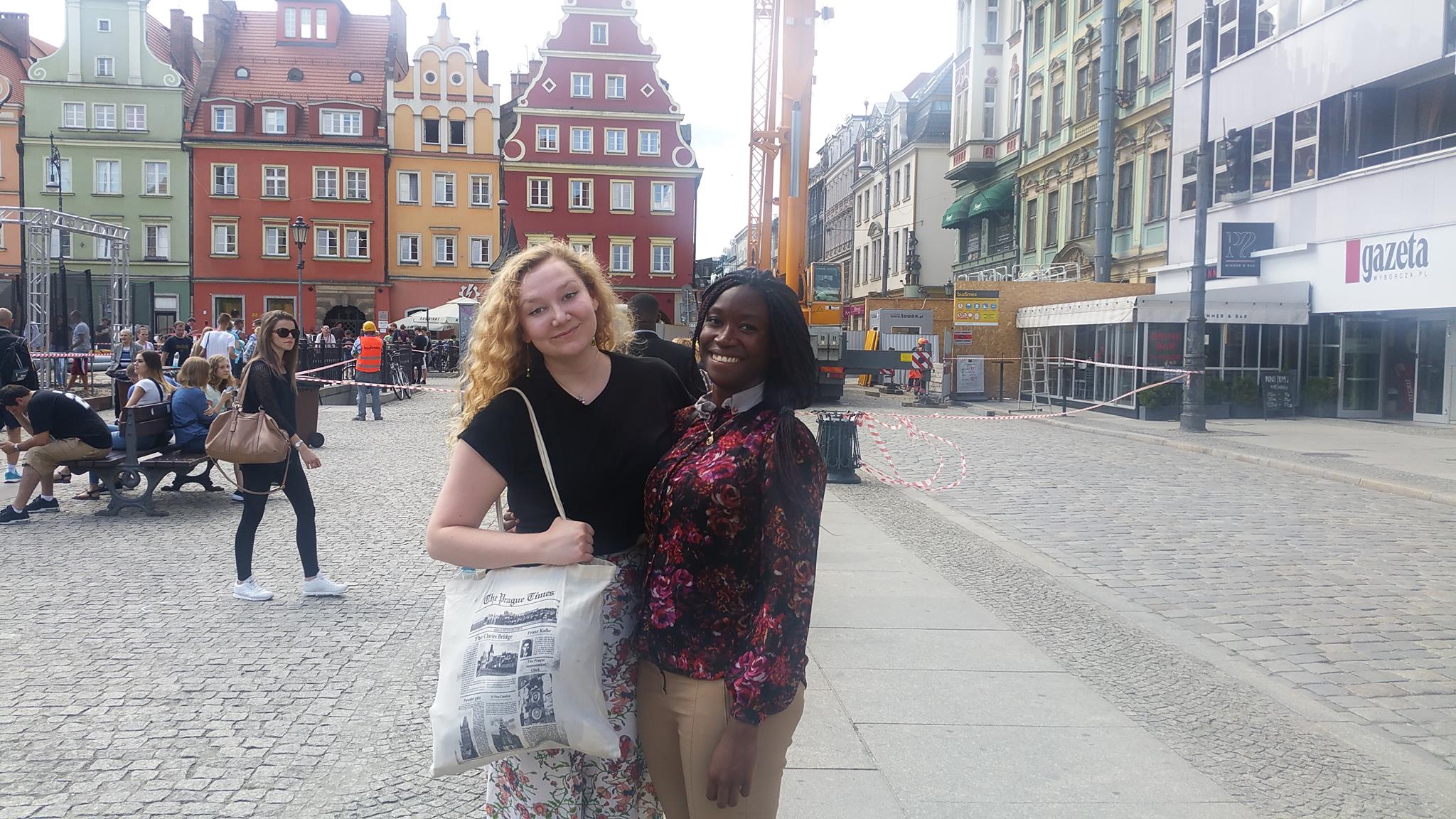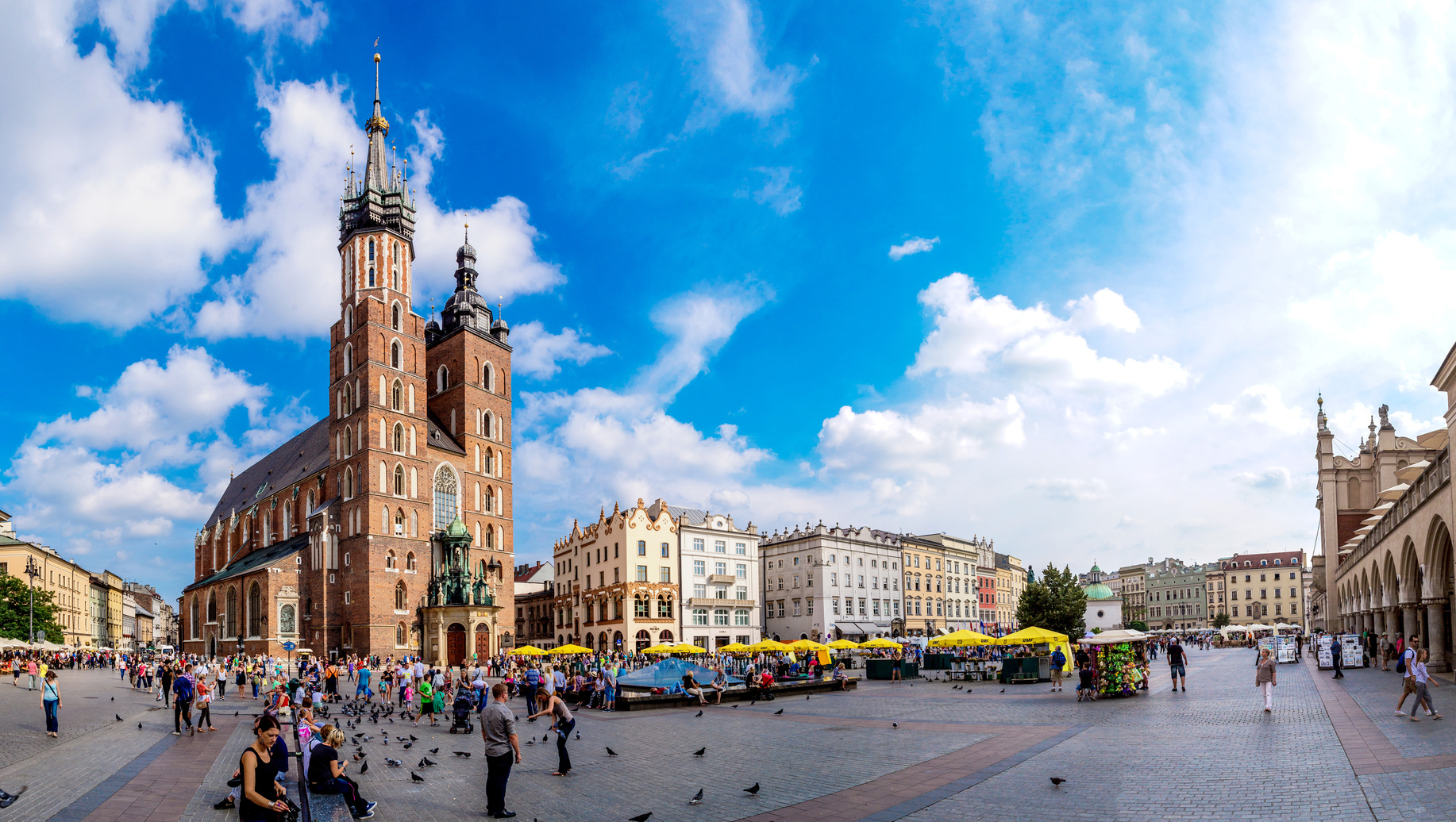
This summer seven of our students spent time at Polish universities on intensive courses in Polish language and culture. We strongly believe that learning should��have a practical dimension and that there is nothing like being in Poland to inspire the most enthusiastic interest in the country and its culture. All of our students were fully or partially funded by the generosity of external donors.
Joss Lloyd and Alan Beaumount��attended courses at the Jagiellonian University in Kraków as winner and runner-up in the . We thank Talkman Language Solutions and Rich Langstaff for sponsoring their trips.
Five other students won scholarships from the��Bureau for Academic Recognition and International Exchange to attend three other Polish universities. Agnes Turay and Madeleine Taylor-Laidler attended classes at the University of Wrocław; Grace Dickinson and Stefan Lacny were at the University of Łódź; and Jaspyr��Geddes-Rainbow was at the University of Warsaw.
Below you can read some reflections on their experiences in Poland.
��
Agnes Turay��(�°��dz�ł����)

Madeleine Taylor-Laidler and Agnes Turay��on the main square in Wrocław
The language course in Wroclaw was truly an amazing experience! I am so happy I was able to take part and I know that I've reaped some long-lasting benefits.
The city itself with its striking colourful buildings is a beautiful location. In the first three days I couldn't go 5 minutes without stopping to take a picture of some pretty bridge or one of 300 dwarf statues located in the city. However, aside from the captivating city the best part was by far the course. We received 60 hours of teaching including listening, reading, writing and speaking activities along with lectures on contemporary Polish culture and history. These lectures were held in Polish so you can imagine that they were a little challenging to keep up with initially but two weeks into the course they became easier to follow. In fact, the vast amount of new vocabulary we were exposed to greatly improved our ability to communicate in Polish ourselves. I also deeply appreciate the heaps of paper resources we were given as we're able to continue this rewarding journey of language learning.
The university made sure we got the most out of our Polish experience by arranging a multicultural evening where our taste buds were tickled with the likes of bigos, kabanos, kasza, various pierogi, sernik, szarlotka and much more. We also had the opportunity to watch some Polish comedies such as Wesele by Wojciech Smarzowski and curious documentaries, all of which also served to improve our interaction with "Polishness".
But perhaps the thing I enjoyed the most, aside from making some amazing friends in the dorm, is the way in which my Polish came along. Though the course is called 'intense', I feel my language skills came along naturally through natural exposure in an environment where I had no choice but to use Polish. This of course made for many funny communication hiccups but that's what I'll remember - the laughter and the learning. Needless to say, I'll be all geared up to do this again!
��
Alan Beaumont��(Kraków) - Runner-up in the Talkman Prize for Literary Translation

The main square in Kraków
The two-week course centred around language lessons which lasted throughout the mornings of every weekday, which provided a fascinating opportunity to further develop my language skills alongside a diverse group of people from all over the world.
Optional lectures in culture and history were held in the afternoons, though I confess I missed many of these in order to take advantage of the vast cultural offerings of the city itself. Some activities were organised by the school, including a guided Polish-language tour of the Old Town and Wawel Castle. A visit to the crypt revealed that so many of the famous figures we had read about in the SL13 course, from Mickiewicz to��Piłsudski, were entombed there��that simply being there functioned as a comprehensive history recap. In the afternoons I took the opportunity to visit some of Kraków's rich array of museums, dealing with topics like Małopolska's prehistoric inhabitants, medieval commerce and history of Kraków's Jews.
However, the most valuable part of the trip for me was the opportunity to simply be in a Polish-speaking, Polish cultural environment, which felt like the culmination of many months of study. Among my fondest memories will be walking around the green spaces of the Podgórze district, drinking locally brewed beers in the old Jewish quarter of Kazimierz and eating herring in an old socialist-style restaurant in Nowa Huta. In all, it was a tremendously enriching experience, and I look forward to visiting Kraków again in the not-too-distant future.
��
Grace Dickinson��(Łó��ź)

Grace Dickinson and Stefan Lacny with friends at the Underground Canal Museum in Łódź
From crumbling communist constructions to renovated factories transformed into leisure complexes, Łódź (pronounced woodge) hosts an eclectic architectural mix of old and new that navigates visitors through its turbulent past. Often likened to being the Manchester of Poland, Łódź exhibits pride in its industrial landscape and this is unequivocally seen in Manufaktura, Poland’s largest leisure centre dressed in the red brick of Izrael Poznanski’s 19th century textile factory. Whereas Nobel prize winner Władysław Reymont gave a disparaging account of 19th Century industrialized Łódź in his 1899 work “The Promised Land”, describing Poland’s third largest city as a “tumour” making a few factory owners rich whilst their workforce starved, this is not the image painted by the red-bricked structures that stand proud, providing shelter to Łódź’s post-communist present and future endeavours. Traversing the industrial landscape is the main street, Piotrkowska, a 5km street lined with shops, bars, restaurants and most importantly the best zapierkanki joint in town! A walk along Łódź’s main commercial street offers a guided tour of the best of the city’s cultural offerings, including a statue of Rubinstein sitting at a piano and HollyŁódź, a walk of fame of Łódź’s most famous cinematic talent, most notably Roman Polanski and Andrzej Wajda. ��
This August Stefan Lacny and I were fortunate enough to explore this architecturally, historically and culturally diverse city by attending a Polish language summer school at Łódź University. Having survived the smallest plane I’ve ever flown on from Amsterdam to Łódź airport, we undertook three weeks of Polish language tuition. At first we felt very much out of our depth; whereas other students could tell the time without pausing to breathe, Stefan and I were better versed in words such as �����ł���Ծ��� (exile), powstanie (uprising) and �Ծ����ǻ����ł��ść (independence) from our comprehensive finals revision. As we had not studied Polish as long as the other members of our class, we both developed coping strategies for the first week. Mine was to mention Harry Potter or Star Wars in order to shadow forgotten declensions with humour. Stefan went for the somewhat more sensible approach of polonizing Russian.
The summer course was invaluable for our spoken Polish. By the end of the second week, we gave a 30minute presentation in Polish about the UK (the phrase po Brexcie [after Brexit] became very useful) and we became experts in ordering beer and food which as all linguists know is the most important skill to master! Although naturally three weeks is insufficient to achieve fluency, Stefan and I much to the annoyance of everyone else would sing the Polish national anthem at any given opportunity. When Poland trumped GB’s Katherine Grainger and Victoria Thornley in the double skulls final at Rio, our disappointment was sweetened slightly by being able to sing along to the Polish national anthem during the medal ceremony. Marsz marsz Dąbrowski…
Łódź may be dwarfed by its older and bigger siblings Warsaw and Krakow, but its landscape is untouched by such a degree of tourism, leaving a raw and authentic city surprisingly steeped in such a wealth of history and culture. So Łódź you like to go to Łódź?��
��
Joss Lloyd��(Kraków) - Winner of the Talkman Prize for Literary Translation

Joss Lloyd��on the ancient Krak Mound on the outskirts of Kraków
I arrived in Kraków for the two-week language course with little expectation as to how it would be. I’d arrived to the Piast dormitory late at night, so my first experience of the town was as we - the 200 or so students - crowded into a big hall in the old part of the Jagellonian University to attend the official opening ceremony the next day. It was decorated finely, with gold patterned walls and panelling, not unlike a �������ϲʿ�����¼ hall. After an inaugural lecture on the perils of literary translation, we were sorted into language classes, which took place for four hours every morning.
The language teaching was of a high standard - the focus on communication complimented the grammatical knowledge I’d acquired whilst studying for paper SL13 in �������ϲʿ�����¼, and the small group sizes (around seven) meant that I always felt involved in the lessons. Our teacher was a particularly lively lady called Jagoda, and her humour and flexibility prevented the mornings from ever being dull.
We generally had the afternoons to ourselves, which I filled with casually exploring the medieval streets, occasionally visiting the one of the city’s many impressive churches and museums. Particularly enjoyable were the Oskar Schindler museum south of the river, and the archaeological museum beneath the market square.
The course included weekend tours: one to the mountains near Zakopane (though heavy rain got the better of our walking excursion), and another took the form of a guided tour around the salt mine at Wieliczka; for me, though, the highlights of the trip were those times spent away from the tourist crowds.
One particularly hot day Alan (a fellow SL13 student) and I walked with Stanley from the town to the almost forgotten former site of the Plaszow concentration camp, passing along the way an ancient pagan religious mound and the overgrown set of Schindler’s List. It surprised me how quickly you could pass from the tourist bustle to almost total isolation - and brought into sharp focus how distant the contemporary life of the city has become from the horrors of its relatively recent past.
On another afternoon Alan and I decided to swap the quaint charm of the old town for the monumental Modernism of Nowa Huta, a suburb a few kilometres to the East, Stalin’s ‘gift’ to the city of Kraków. Here the streets were wide, ordered and grey, and the only restaurant seemed not to have noticed that the days of the Soviet Block were over: in the corner stood a bronze figurine of Comrade Lenin watching out for misbehaviour.
What was great about the trip for me was the fact of having something to look forward to after graduating: instead of the anti-climax of heading back home, I was able to enjoy getting to know a new town. Not to mention the glorious sunshine and barmy evenings that make Kraków a great place to spend the summer. I’m thankful that the Talkman translation competition gave me such a rewarding opportunity.
��


